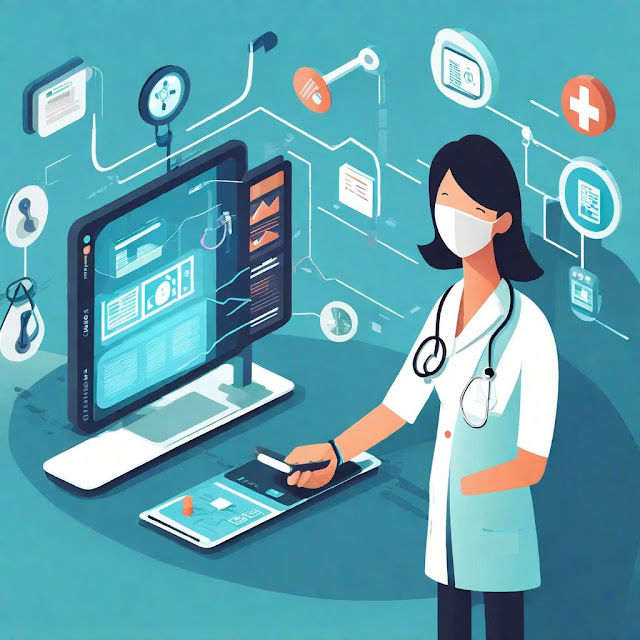In today's fast-paced world, healthcare has undergone a remarkable transformation with the advent of digital health. This innovative approach to healthcare delivery leverages technology to enhance patient outcomes, streamline healthcare processes, and empower individuals to take control of their well-being. In this comprehensive guide, we delve into the realm of digital health, exploring its significance, evolution, benefits, challenges, and the potential it holds for the future of healthcare.
Table of Contents
- Introduction
- Understanding Digital Health
- The Evolution of Digital Health
- Key Components of Digital Health
- Benefits of Digital Health
- Challenges in Implementing Digital Health
- The Role of Telemedicine
- Digital Health and Data Security
- Digital Health and Chronic Disease Management
- The Future of Healthcare: A Digital Revolution
- Frequently Asked Questions (FAQs)
- Conclusion
Introduction
Digital health, a term synonymous with the integration of technology into healthcare, has rapidly become a significant force in the medical industry. As the world becomes increasingly connected and reliant on digital solutions, healthcare providers, patients, and innovators are embracing this technological wave to usher in a new era of healthcare.
In this article, we will explore the nuances of digital health, its evolution, key components, the associated benefits, challenges, the role of telemedicine, data security, and its impact on chronic disease management. By the end of this comprehensive guide, you will have a deeper understanding of the transformative power of digital health and its potential to revolutionize the healthcare landscape.
Understanding Digital Health
Digital health encompasses a wide array of technologies, systems, and services that aim to improve the delivery, management, and outcomes of healthcare. At its core, digital health revolves around leveraging digital tools and data to provide more personalized, efficient, and accessible healthcare services.
The Evolution of Digital Health
The concept of digital health is not a recent development; it has been evolving over the past few decades. Initially, it was primarily associated with electronic health records (EHRs) and healthcare information systems. However, with the rapid advancements in technology, it has expanded to encompass a broader spectrum of applications.
From wearable fitness trackers and mobile health apps to telemedicine platforms and artificial intelligence-driven diagnostics, the evolution of digital health has been nothing short of remarkable.
Key Components of Digital Health
Digital health consists of several key components, each playing a pivotal role in shaping its landscape:
1. Wearable Devices
These include fitness trackers, smartwatches, and other portable gadgets that monitor various health metrics such as heart rate, sleep patterns, and physical activity.
2. Mobile Health Apps
A wide variety of mobile applications cater to different aspects of healthcare, from medication management to symptom tracking.
3. Telemedicine
Telemedicine platforms enable remote consultations with healthcare professionals, providing convenience and accessibility to patients.
4. Electronic Health Records (EHRs)
EHRs store patients' medical records electronically, allowing for easy retrieval and sharing among healthcare providers.
5. Artificial Intelligence (AI)
AI technologies are used for diagnostic purposes, predictive analytics, and personalized treatment plans.
6. Health Information Exchange (HIE)
HIE facilitates the secure exchange of patient information between different healthcare entities.
Benefits of Digital Health
The adoption of digital health solutions offers a multitude of benefits that impact both healthcare providers and patients alike.
Improved Access to Healthcare
One of the most significant advantages of digital health is its ability to break down geographical barriers. Telemedicine, for instance, allows patients to consult with specialists from the comfort of their homes, ensuring that healthcare is accessible to a broader population.
Enhanced Patient Engagement
Digital health encourages patients to actively participate in their healthcare journey. Mobile apps, for instance, enable individuals to monitor their health, set goals, and track progress, promoting a sense of responsibility for their well-being.
Streamlined Healthcare Processes
The integration of EHRs and other digital tools simplifies administrative tasks, reduces paperwork, and minimizes the risk of errors in medical records. This streamlined approach enhances the efficiency of healthcare delivery.
Personalized Treatment Plans
Artificial intelligence and data analytics help healthcare providers tailor treatment plans based on individual patient data. This personalization increases the likelihood of successful outcomes.
Data-Driven Decision-Making
The wealth of data generated through digital health solutions enables evidence-based decision-making. This, in turn, leads to better healthcare practices and outcomes.
Challenges in Implementing Digital Health
While the benefits of digital health are substantial, there are challenges that must be addressed for its successful integration.
Privacy and Data Security
The collection and storage of sensitive patient data raise concerns about privacy and data security. Robust measures must be in place to safeguard this information from cyber threats.
Regulatory Compliance
Digital health technologies must adhere to stringent regulatory standards to ensure their safety and efficacy. Navigating these regulations can be complex for innovators.
Connectivity Issues
Access to digital health services relies on internet connectivity. In remote or underserved areas, the lack of reliable internet access can hinder the adoption of these technologies.
Patient Adoption
Not all patients are equally tech-savvy or comfortable with digital solutions. Encouraging widespread adoption requires education and support for individuals of all ages and backgrounds.
The Role of Telemedicine
Telemedicine is a cornerstone of digital health, revolutionizing the way healthcare is delivered. It enables remote consultations, diagnostics, and treatment. The benefits of telemedicine include:
Convenience: Patients can access healthcare services from their homes, reducing the need for travel and waiting times.
Cost Savings: Telemedicine often reduces healthcare costs, especially for routine check-ups and consultations.
Accessibility: Remote areas or underserved communities gain improved access to healthcare services.
Preventative Care: Telemedicine facilitates early intervention and proactive healthcare, preventing health issues from worsening.
Digital Health and Data Security
With the increasing reliance on digital platforms for healthcare, data security is of paramount importance. Patients trust healthcare providers with their sensitive information, and breaches can have severe consequences.
Measures such as encryption, two-factor authentication, and secure cloud storage are essential to protect patient data. Additionally, healthcare professionals must undergo training to ensure they handle patient information securely.
Digital Health and Chronic Disease Management
One of the areas where digital health has shown tremendous promise is in chronic disease management. Conditions such as diabetes, hypertension, and heart disease require continuous monitoring and management. Digital health tools enable patients to track their condition, receive medication reminders, and communicate with healthcare providers, leading to better disease control and improved quality of life.
The Future of Healthcare: A Digital Revolution
The future of healthcare is undeniably intertwined with digital health. As technology continues to advance, we can expect to see even more innovative solutions that further transform the healthcare landscape. Some of the exciting prospects include:
AI-Driven Diagnostics: AI algorithms will become increasingly accurate in diagnosing medical conditions, potentially leading to earlier interventions and more precise treatments.
Virtual Reality in Healthcare: VR is poised to revolutionize medical



